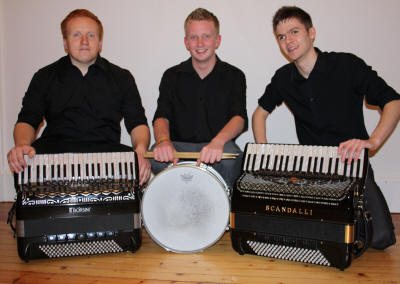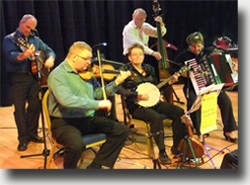Scottish Ceilidh Bands - for your Event
Live Music Booking Service for Your Party, Wedding or Event from - Midsummer Music - the music people
To see available Scottish Ceilidh Bands
select your County or Location
About Scottish Ceilidh Bands
The Scottish Ceilidh Band pages list bands that are available in your area. People sometimes get confused by the different names - Ceilidh dance, Barn dance or Hoedown - for what is basically the same thing, with many tunes and dances in common, but for a Scottish Ceilidh, Scottish folk tunes and some specifically Scottish dances. If you are unsure, discover what kind of dance band would be suitable for your wedding reception or event in your area, by clicking on the link below:
There are many styles of Scottish Ceilidh Band and you should think about whether you are wanting a band who play only specialist Scottish music, or one that has a wide Scottish repertoire, but can also play other musical styles for variety. If purely Scottish, then are you wanting a very formal East Coast Scottish type reeling event, or dance with complicated strathspeys and dances like the Reel of 51st and moderately difficult Eightsome Reel, or more a West Coast Scottish event, including some Irish tunes and less formal dances. Bands that fit one bill may not fit another.
If your wedding, birthday party or other event doesn’t have a large number of Scots at it, then probably a Ceilidh Band who play a fair amount of Scottish music but include other music and dance, would be more appropriate. It gives variety in the music itself and allows easier dances to be included. (many Scottish dances can be a bit on the difficult side for people who have never done ceilidhs before). Another consideration is that Pure Scottish Ceilidh Bands tend to be more expensive than those who play a variety of music.

If you do want a band who can play just Scottish music, then it is important to define this. Also, if you want the complex dances, you need to define this and give some examples. There are bands who play a totally Scottish repertoire in perfect style, do dances like Strip the Willow, Gay Gordons etc. but do not call the complex dances (thought they are usually happy to play for them if a group of guests knows them without being called). Only some bands have callers who are happy to call the complex dances for a group of people that they have not met before and whose abilities they have no idea of.
Be realistic in your expectations. It is not uncommon for a band to be asked to do a list of the more complicated dances, only to find that many of the dancers have never done these dances before or are not really good enough to manage them, so are unable to follow the instructions. In such a situation the caller either continues with complicated dances, half the guests are unable to do them, so give up and are unhappy all evening; or the caller reverts to easier dances that everyone can do and the experts get disgruntled. If the caller announces the dances as difficult or easy so that guests can choose what they attempt, it is normally found that very few dancers will put themselves forward for the difficult dances.
So you need to make a realistic judgement about your guests and their abilities. Some Scottish dances are very difficult for the novice, so think whether you need to pitch things at the level of the majority. If there are a group of guests who are reasonably familiar with the dances, encourage them to help the caller demonstrate the dances when they are first explained. That can be a tremendous help to the novices. (The caller will run through the dance slowly, without the music, explaining the moves, but seeing a group of people doing them correctly can make all the difference.)
The other thing to guard against is the event where one person designates themselves ‘the expert’ and constantly tells the Caller that the dance should be done ‘this way’ or ‘that way’, or that they want ‘this that and the other’ dance next. There are slightly different version of many dances, even the basic dances like String the Willow. The caller will know their own version. Also, the caller will have their own set of dances that they are familiar with calling. To be asked to call another dance, on the night, is often not realistic. If you define some dances that you want when you make your booking, the caller can make sure they have refreshed their memories on those dances, but not out of the hat on the night. Such issues can be very distracting for a caller who is trying to sort out a hundred or more people who don’t really know the dances, so it is best to avoid such situations.

By thinking about such issues at the time of booking you can ensure that the Ceilidh is tremendous fun for everyone. So, to summarise; you will find all the kinds of bands that are described above on the Scottish Ceilidh Band pages. Read their descriptions, listen to their music and even define on your enquiry to us the type of band and caller that you are looking for.
The band often get the dance started by playing a tune or two to set the
mood. For a Scottish Wedding Ceilidh a Scottish Ceilidh Band would normally do a first
dance that included the Bride, Groom and wedding guests. The Caller would ask
everybody up to join the Newlyweds. (No one can not do so, because it would be
impolite). The Caller will make the first dance really easy so that even those
who were lacking confidence find they could manage it. This gets the dancing off
to a good start. (Some couples like to do a first dance to a waltz, then invite
everyone to join them, or alternatively do a prepared dance to a track provided
by them on a CD. This can also be a good start.
For a Scottish style birthday party Ceilidh or corporate event, it is very
similar. The first dance is generally simple, so that the Caller can gauge how
much people do or don't know, how quick on the uptake they are, an how lively
they seem. The dancers become more sure of themselves, and the caller is able to
gauge the difficulty of dances that would suit for the Ceilidh.
Scottish Ceilidh Bands always have a Caller who explains the dances, so that
people who have never been to a Ceilidh before can enjoy themselves. The Caller
asks people to form dance sets, often not knowing what dance to do until they
know how many people have come up. They will demonstrate the dance, running the
dancers through the moves slowly. They may run them through all or some of the
dance again, depending on how difficult it is and how whether the dancers seem
confused still. Then the band play a brief introduction and the dancers are off.
The caller keeps an eye on what is going on, perhaps calling instructions and
helping those who have got muddled up or gone the wrong way. Mistakes are
expected, so never take it too seriously.
Generally there is be an interval part way through the Ceilidh for a food, so
that people can get a rest and stump up some more energy for the rest of. If
there are some experienced dancers, the Caller could do a few harder dances for
them, but all in all they will make sure that everyone is involved and enjoying
themselves.
A Ceilidh can be great fun. It's a perfect option for Parties, Evening Receptions and other functions e.g. corporate entertainment and retirement parties. It gets everyone to interact and the volume level is low enough that people can still hear each other speaking - (not like when there is a DJ in full swing!)
Some people are unclear about the difference between a Ceilidh Band and a
Barn Dance Band. The reality is they are basically the same. They have a caller
who guides the dancers and the band will play traditional folk music to dance
to.
Ceilidh is the Scottish and Irish term, so this includes Scottish Ceilidh Bands
and Irish Ceili Bands. (Notice the different spelling. Other spellings are
Caleigh, Kaley, kaylee, kayleigh etc. so you can't really spell it wrong!) The
bands would mostly play Scottish and Irish folk tunes. Many tunes are claimed by
the Americans, Scotts, Irish and English, but the way of playing them would
vary.
Barn Dance ends to be the English and American terminology, where English or
American folk tunes would be played. Having said that, many of the dances are
common to both a Ceilidh dance or a Barn dance.
Many bands perform a range of songs and do dance that spans to suite. This is
particularly good for a wedding ceilidh or birthday barn dance, where styles
need to be catered for. For an event such as a Irish St Patricks night, or a
Scottish Burns night, then a specialist band would be more suitable.